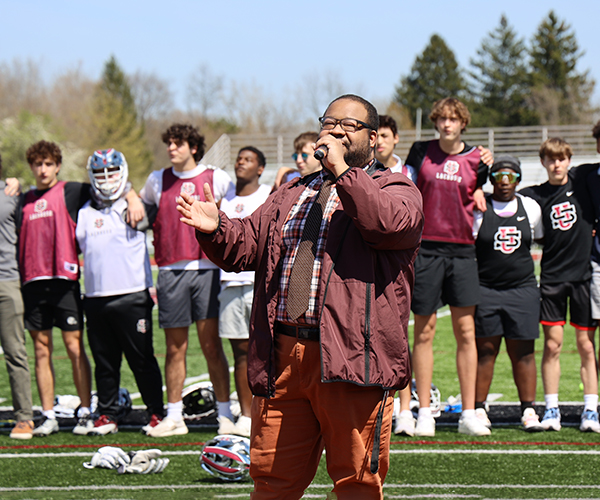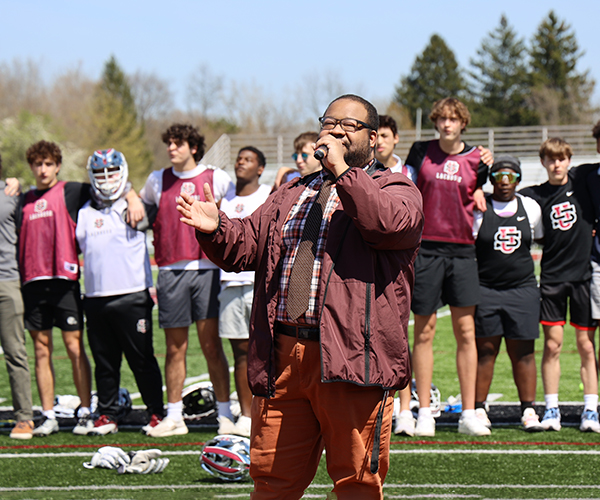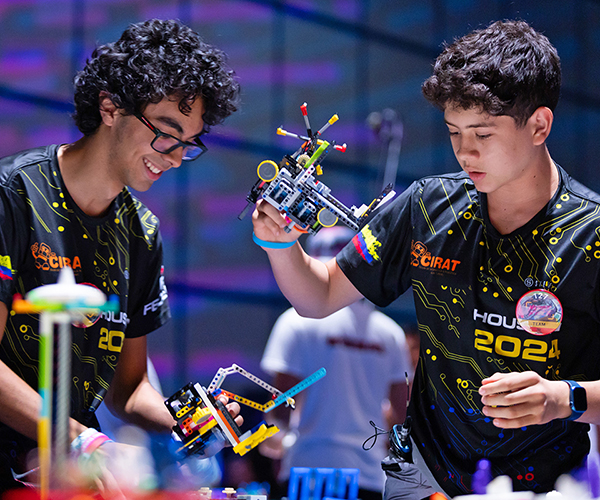A few years ago, Mary Sheridan sat before admissions counselors at Baldwin Wallace College (now University) hoping to show she had what it took for college success.
She was a West Geauga High School senior with great grades and test scores, along with college credits earned through concurrent enrollment at Lakeland Community College her junior and senior year.
What Sheridan also had was a well-rounded resume of extracurricular activities — directing school plays and morning announcement broadcasts, volunteering through her local Rotoract chapter, mentoring struggling classmates and serving as captain of West Geauga's cheerleading squad.
None matched up precisely with her chosen major — communications with a minor in leadership studies — but all gave Sheridan skills that helped get her into BW and to excel over the last three years.
"Freshman year of high school, I joined everything, but after experiencing them I saw what fit me best," says Sheridan, 20, who will graduate from BW next summer. "I'm still using my [high school] extracurriculars and experiences. • It helped me learn when I got into college what I wanted to do."
Today, she's on the other side of the admissions desk as a year-round intern in BW's admissions department. She takes every chance to advise high schoolers who are hoping they've chosen extracurriculars that will grab an admission director's attention.
"Extracurriculars give you something to talk about [in pre-admission interviews]," she says. "It's a bridge that connects you to the college."
Like Sheridan, most high school students approach the college admissions process with at least some extracurricular activities under their belt, whether it's athletics, clubs, community service or even hobbies.
The National Center for Education Statistics has put the rate of participation in high school extracurricular activities as high as 88 percent, with documented correlation to positive school outcomes. Involved students have higher SAT scores and GPAs, as well as lower absenteeism. Naturally, they also have higher expectations of pursuing post-secondary education.
But the fight for admission to competitive universities and high-demand scholarship dollars has many parents and students wondering, Just how important are extracurriculars? How many and which ones will provide that admissions edge?
"There's this notion that there's a checklist — If I do these six things, then I will get in," says Rick Bischoff, vice president for enrollment at Case Western Reserve University. "I am careful to talk about how the student engages in their community. • Based on what you have done, who will you be in our community?"
Demonstrate stick-to-itiveness.
It may be their joie de vivre driving a student to try every available activity, club or team — or simple boredom prompting a jump from one thing to the next. Perhaps it's an attempt to pad a resume with a long list of involvements.
Regardless, having a litany of activities without evidence of sustained effort is a red flag in college admissions.
"They are advantaged by choosing activities they can stick with," says Bischoff. "There's learning that comes with doing things over time."
That's not to say that you should grit your teeth through four years of an activity you hate.
"We teach sticking with things but also knowing when to make a change," says Hallie Godshall, dean of students for Hathaway Brown's upper school. "Freshman and sophomore years are times to investigate. By the time they are juniors and seniors, we encourage them to go into more depth about the things they are interested in."
Sometimes students leave an activity because they've failed, and might be tempted to leave that failure off of their college applications.
Susan Dileno, vice president of enrollment management at Baldwin Wallace University, says she wants to hear about the successes and failures that an applicant has faced.
"It's impressive to read an application that says, •I was cut from the team, but I tried again and I never gave up,' " says Dileno. "It says a lot about the student."
Extracurricular activities are the place where students should try the hard stuff, says Bischoff, even if it means risking failure. Those lessons will help during the tough challenges of college life.
In such instances, Godshall suggests a message to students like this — "You know, I was excited about it and I tried it, but I found that these other things were what meant more to me," she says.
As for those resume-padders? Admissions directors can sniff them out a mile away.
"You see some students with long lists of activities, but no one [in letters of recommendation] talks about engagement because there isn't a lot of substance," Bischoff says.
At Cleveland State University, extracurricular activities aren't factored into the general admissions process. But when it comes to being admitted to a selective school or program, like CSU's School of Nursing, activities pursued outside the classroom become very important.
Marjorie Placek is the school's assistant dean and says time spent interacting with people in a "helping environment" — such as shadowing a health care professional, working as a nurse's aide or volunteering with kids with disabilities — can be highly influential as she narrows more than 200 applicants down to the 85 accepted each year.
"Students who impress us have taken the time to volunteer despite other family commitments • and have taken a leadership role," says Placek. "They learn to put someone else in front of their own needs."
The students who come into her program with sustained exposure to the health care environment approach their first clinicals — which start just eight weeks in — with more confidence and less squeamishness.
And those who don't?
"We've had students who don't get past the doorway," she says. "They run out of the unit. It's overwhelming. The opposite is a student who says, •I can handle this.' "
Be your own best publicist.
One of the biggest mistakes applicants make, Dileno says, is omitting certain extracurricular activities from their application.
"Students don't know how to self-promote," she says. "What they think is insignificant, they may leave off."
Promoting yourself is an exercise college counselor Hugh McManamon runs St. Ignatius High School students through in their junior year.
He tells them to write down everything they do outside of the classroom, even if it's not an organized activity.
"They may say, I like to travel so I'm working two jobs so I can go to Europe," McManamon says. "That's something they should talk about [to colleges]. That kind of initiative is so amazing."
For students who work during the school year, extracurricular involvement might not be possible. But with the right approach, even a job serving fast food can convey as much about a student's strengths and character as a class presidency would.
"It's not about learning to work the griddle," says Godshall. "It's about showing up to work on time, getting the job, making yourself valuable. How do you work with a team or different managers? Let's talk about what skills you learned."
Sheridan was captain of her cheerleading squad at West Geauga and has continued cheerleading at BW. But what was more important was her ability to use that high school experience to promote her strengths.
"I talked about cheerleading as a leadership experience. The traits I learned are very genuine and can translate into anything," Sheridan says. "I haven't been as high up in all of my activities. I knew how to be a follower when needed and how to lead when I needed to lead."
Even a hobby, no matter how obscure, can be an opportunity to talk about your strengths and set you apart from the crowd.
"I saw a female student once who loved working on cars," says Dileno. "Students like that are interesting and it adds to the student body."
Godshall recalls a student who came to Hathaway Brown seeking admission and who loved building miniature furniture. Godshall's interest was piqued by this unique hobby, opening the door to a discussion about the girl's passions that made her more memorable in the admissions process.
"I've seen so many kids say, •Oh my gosh, you really think that's cool?' " she says. "They didn't know it was a valid use of their activities."
Do something. Anything.
There's a lot of variety in extracurricular activities at many schools today, not to mention opportunities to get involved in local community groups, religious organizations or volunteering.
That leaves students with no excuse not to do something.
At St. Ignatius, McManamon says it's rare to find a boy who sits out on extracurriculars at a school where, he asserts, there is truly something for everyone.
There's a group of students doing urban gardening not far from the school's Ohio City campus, another group keeping bees, and an investment club. Students who like juggling can join the St. Ignatius Circus Company.
There's even a group that calls itself the Snowmen for Others of St. Ignatius. They watch for a color-coded flag to fly from a specified window on winter days, a sign that it's time to meet and head into the neighborhood to shovel driveways and sidewalks.
Avoiding all extracurricular activities doesn't just look bad on a resume. It leaves references without much inspiration.
"We don't write a boilerplate," says McManamon. "I want to be able to talk about this kid's passion. If that's not there, it's really tough [to write]."
At Hathaway Brown, students have access to 42 clubs, 11 athletic teams and 40 elective courses. When other demands make after-school activities difficult, Godshall pushes students toward elective classes they can explore during the school day in a low-risk, pass/fail environment.
"Look for ways to make your passion link to your career," says CSU's Placek.
If horseback riding is your passion but you hope to become a nurse, then look for opportunities to volunteer with an adaptive horseback program for kids with disabilities. If you are an athlete, spend time volunteering with Special Olympics.
Think life success, not just admission success.
While admission to that dream university might seem like an end in itself, these experts advise against that thinking.
The activities that high school students choose to pursue in their spare time should be selected with a longer-term goal in mind.
"If you have to do something every waking moment to impress a college, then you're missing out," says McManamon. "Find what you love to do and do it deeply, continuously, explore all aspects of that activity. It's about becoming more fully human."
That can be a hard lesson for students to learn when there's outside pressure to participate in specified activities. It could be a family member encouraging activities that fulfill a family tradition, or even the hearsay of their fellow college-bounds.
"It can be what they've heard in the media or that a friend got in because of this," says Godshall. "Just doing it won't make it look good. It's how you talk about it, how your teachers talk about it, how your references talk about it. That uniqueness is what's going to open doors for you."
Colleges are looking not for resumes, but for individuals, and Bischoff insists that it takes many different kinds of individuals to make up a healthy school community and a more successful student.
"They're 17. They need to be hanging out with their friends. That's a healthy thing," says Bischoff. "It's what are you so committed to that you choose to do it in your free time."
For Sheridan, ironically enough, her passion for extracurricular activities at the high school level have directly led to her desired professional path. She's planning a career in either admissions or university student life, allowing her to continue helping college students get connected to on-campus activities.
"What do I love to do? What am I good at doing?" says Sheridan. "My answer is extracurriculars. That's what I thrive at."



